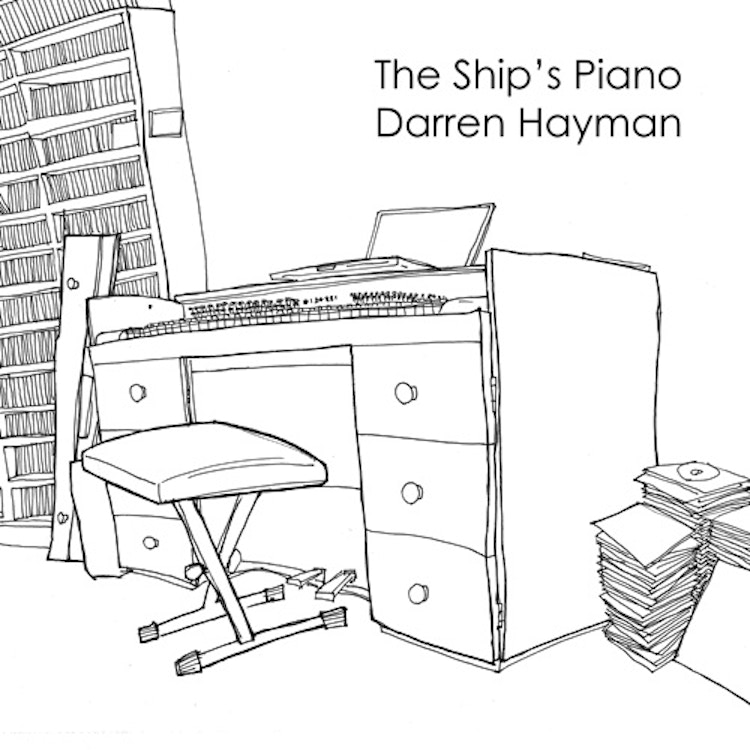"The Ship's Piano"

Something says if he’d been at this stage of his career a decade or so ago we might already be hailing Darren Hayman as a great English songwriter, one with a recognisable post-Ray Davies but still singular streak of English suburban chord-striking ennui and associatory underbelly to his catalogue. A more grounded Robyn Hitchcock, maybe, or a less pseudo-intellectual Lloyd Cole. As it is, while he has some name recognition the less considerate times, coupled with his being camped in the critically wavering field of indiepop, has left him well under the wider radar. For context on such pessimism, this reviewer saw him play to about 25 people a few months ago, largely in promoting an album reissue by the band he split nearly a decade earlier.
This fifth solo album post-Hefner was to an extent born out of expediency. In November 2009, following a gig in Nottingham, he was dragged out of his car and attacked, resulting in a fractured skull. Finding louder frequencies temporarily intolerable he took partly as therapy to his fold-out piano – ‘ship’s piano’ is a term for small-scale pianos used on boats – and began writing songs of a calmer, quieter nature, finding himself as a consequence leaving aside his character studies in favour of more direct lyrical constructs.
That said The Ship’s Piano is not a voice and piano alone collection, though the latter is at the heart of everything. The arrangements remain sparse and airy, occasionally borrowing from Hayman’s past – the title track, a lament for the construction and history of the instrument, has the kind of loosely intuitive playing in the round the first Hefner album Breaking God’s Heart, while the saturated synths and electronic beats of ‘Oh Josephine’ call to mind that band’s divisive swansong Dead Media. Meanwhile the brushed drums and languidly soulful air of ‘I Taught You How To Dance’ resemble an out-take from Hayman acolytes the Wave Pictures’ If You Leave It Alone album, in which the nostalgia for ungainly experience is fortified by the classic Hayman get-out clause, “a little too much wine”.
If there is an overriding return to the Hayman palette here, though, it’s in the intricate sketching of awkward sexual encounters, the passage of time and life lessons removing a layer of clumsy naivety. In fact maybe calling their setting ‘sexual’ suggests something these songs aren’t in their small detail and sentiment, not when ‘It’s Easy To Hang With You’ is telling its object of desire “I missed you too, I just didn’t realise”, though the addition of the line “when we let go we have sweethearts that love us” after the core feeling expression suggests its own fidelity wars. ‘No Children’ isn’t a Mountain Goats cover but is just as quietly devastating as Hayman lays out a world without children playing, sleeping or on boats “being dragged by the undertow, crying to be saved”. ‘Old House’ is an elegantly sketched picture of being left in domestic solitude, observing first the decay of “carpets that fade in the sunlight” then the car that “won’t start without your serenade”, realising and accepting “my heart’s with the keys by the door” before woozy muted trumpet, something which the album boasts quite a bit, and blurry keyboards struggle not to fall over each other in taking the song out on wistful plains.
If nothing else Hayman remains committed to a work ethic. While the third part of his long gestating Essex trilogy and the album version of his track-a-day January Songs project await release, he’s still fully capable of producing a resolutely rounded set of songs from a seperate musical source material that are as simple at their beating heart as they are exquisitely conceived and detailed. That he isn’t feted from the suburban chronicled rooftops is most people’s loss.
Get the Best Fit take on the week in music direct to your inbox every Friday

Wet Leg
moisturizer

MF Tomlinson
Die To Wake Up From A Dream

BIG SPECIAL
National Average





